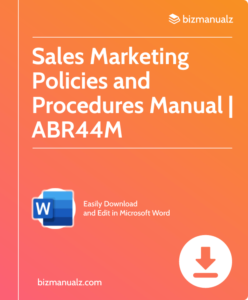What are The Compliance Standards for a Sales Marketing Policy Procedure Manual?

Compliance standards must be embedded in a sales & marketing policy procedure manual. This ensures adherence to legal and ethical guidelines, allowing for transparency and protection of customer interests. It also builds trust in the marketplace. The manual should include guidelines on data protection, ad regulations and fair competition. This prevents legal issues and safeguards the company’s reputation. What are the compliance standards for a sales & marketing policy procedure manual?
Introduction to Compliance Standards for a Sales & Marketing Policy Procedure Manual

Sales Marketing Policies and Procedures Manual | ABR44M
A comprehensive section on privacy and data protection is essential. This should cover consent requirements, secure storage of personal information and handling customer data breaches. Respecting data privacy builds trust with customers and complies with laws like GDPR.
Advertising regulations must also be considered. The manual should outline guidelines on truthful advertising and avoiding deceptive practices. Obtaining necessary permissions for endorsements anddisclosing any paid collaborations or affiliations is key.
Finally, guidelines on avoiding anti-competitive behavior, such as price-fixing or exclusive dealing agreements, should be included. Training sales and marketing teams on legal boundaries helps prevent violations, which can lead to heavy penalties or damaged business reputation. Unlock the secrets to sales and marketing success! A well-structured plan is worth its weight in gold.
Key Components of a Sales & Marketing Policy and Procedure Manual
To ensure a robust sales and marketing policy procedure manual, turn to the key components of this manual. Delve into the definition and importance of such a manual, while also gaining and overview of the compliance standards and regulations specific to the sales and marketing industry.
Definition and importance of a sales & marketing policy procedure manual
A sales & marketing policy procedure manual is and essential document that outlines the strategies and protocols of and organization. It’s a valuable tool that ensures consistency, efficiency, and accountability within the team. It provides clear instructions on aspects such as lead generation, customer acquisition, pricing policies, promotional activities, and customer relationship management.
This manual acts as a reference for employees to understand organizational goals, objectives, and guidelines. It creates a unified approach to achieving business targets with a standardized framework.
The manual also maintains brand consistency across all marketing channels. It outlines specific guidelines for communication strategies, advertising techniques, and branding elements. This helps to create a cohesive brand image that resonates with customers.
It serves as a training resource for new hires and a repository of best practices, successful case studies, market insights, and industry trends. This information helps organizations build upon past successes while avoiding repeating past mistakes.
To maximize its potential, the manual should be updated regularly to keep up with changing market conditions.
By investing in a comprehensive yet flexible manual, businesses can give their teams greater autonomy. They can make informed decisions without seeking approval, and gain a competitive edge in the market. Compliance standards and regulations ensure that sales and marketing stay legal. Act today and unlock the potential of your sales and marketing activities.
Overview of compliance standards and regulations applicable to sales & marketing
Adhering to compliance standards and regulations is vital in sales & marketing. It ensures ethical business practices, guards consumers, and keeps competition even. Here’s a glance at the key compliance standards and regulations for sales & marketing:
| Compliance | Description |
|---|---|
| Fair Competition | Prevents unfair trade practices |
| Consumer Protection | Guarantees rights of consumers |
| Truth in Advertising | Calls for honesty in advertising |
| Data Privacy | Shields customer information |
| Anti-Spam Laws | Governs unsolicited messages |
| Intellectual Property Rights | Preserves creative works |
| Pricing Transparency | Ensures clarity in pricing |
It’s also significant to stress other aspects related to compliance standards and regulations:
- Companies must stay up-to-date with current laws to guarantee compliance.
- Regular monitoring and internal audits can help spot any prospective non-compliance issues.
- Education courses should be done for employees to raise consciousness about compliance requirements.
To ensure compliance, here are some tips:
- Make clear policies: Make complete policies that describe expectations for employees regarding compliance with relevant standards and regulations. These policies should be open to all employees.
- Do regular training: Hold frequent training meetings to teach personnel about the particular rules and regulations related to their role within the sales and marketing division.
- Assign a compliance officer: Designate a solitary person or team responsible for overseeing adherence to compliance standards within the organization. This will give center and accountability.
By following these tips, companies can increase their understanding of compliance standards and regulations while also reducing the risk of non-compliance. In the end, this will result in a more ethically sound sales and marketing atmosphere. So, make sure to incorporate compliance standards into your sales & marketing policy procedure manual; after all, sometimes following the rules is the only way to prevent selling ice to Eskimos!
Compliance Standards for a Sales & Marketing Policy Procedure Manual
To ensure compliance standards for a sales & marketing policy procedure manual, familiarize yourself with the requirements for legal and regulatory compliance, ethical compliance, and data protection and privacy compliance. Each sub-section provides essential solutions to help you maintain the necessary standards for your organization’s policies and procedures.
Legal and regulatory compliance
The table below outlines key legal & regulatory compliance aspects for sales & marketing policy procedure manuals:
| Aspect | Description |
|---|---|
| Privacy Laws | Data protection regulations |
| Advertising Standards | Guidelines for truthful & fair ads |
| Consumer Protection | Protecting customer rights |
| Intellectual Property | Copyrights, trademarks & patents |
| Antitrust Regulations | Preventing anti-competitive behavior |
| Product Labeling | Labeling requirements for accurate info |
It’s important to stay on top of any changes in laws & industry regulations that could affect sales & marketing activities. Training programs should be set up to teach employees about compliance best practices.
The Enron scandal is a great example of why compliance is so important. Enron failed to stick to accounting regulations & it cost them dearly. This serves as a reminder of the need for organizations to have strict compliance standards.
To sum it up, legal & regulatory compliance is the cornerstone of a sales & marketing policy procedure manual. Adhering to compliance measures not only promotes ethical practices, but also safeguards customers & company reputations.
Overview of relevant laws and regulations for sales & marketing activities
Sales and marketing activities must comply with laws and regulations to ensure ethical conduct and fair competition. This helps companies maintain trust with their customers, and avoid legal problems. Here’s and overview of some key laws and regulations:
- Consumer Protection: The FTC Act blocks deceptive ads, false claims, unfair competition, and fraud. This shields customers from businesses’ misleading info or unlawful tactics.
- Privacy Regulations: GDPR and CCPA control how businesses handle personal data. Companies must follow stringent rules to protect individuals’ privacy rights.
- Advertising Standards: ASA sets guidelines for honest ad content. Adverts should not mislead consumers, respect social values, and comply with industry standards.
- Anti-Spam Laws: The CAN-SPAM Act handles email marketing practices. Businesses must obey specific rules about opt-outs, sender info, subject lines, and message content.
Below is a summary of these laws and regulations:
| Law/Rules | Description |
|---|---|
| Consumer Protection | Prohibits deceptive advertising practices |
| Privacy Regulations | Regulates collection, use, storage & disclosure of personal data |
| Advertising Standards | Sets guidelines for truthful ad content |
| Anti-Spam Laws | Regulates email marketing practices |
An example of the consequences of inadequate compliance is a telecommunications company. They launched a campaign with false claims, generating customer discontent and a drop in trust. Consequently, regulatory authorities imposed fines for breaking consumer protection laws and damaging their reputation.
Following legal regulations for sales and marketing activities is like having a lawyer at a party – you may not have as much fun, but it keeps you out of trouble.
Ensuring legal compliance in sales & marketing policies and procedures
Ensuring legal compliance in sales and marketing is a must for any organization. Companies must create a set of guidelines and procedures to meet standards. These policies make sure sales and marketing activities adhere to industry regulations and internal company standards.
To illustrate, let’s look at and example table:
| Policy Element | Description |
|---|---|
| Code of Conduct | Outlines ethical standards for sales and marketing |
| Advertising Guidelines | Rules for accurate and transparent advertising |
| Data Privacy | Protects customer data |
| Intellectual Property | Safeguards company trademarks, copyrights, and patents |
| Anti-Bribery | Prohibits offering or accepting bribes |
Each policy element is key to legal compliance. The Code of Conduct sets ethical guidelines and Advertising Guidelines promote transparency. Data privacy protects sensitive customer information, Intellectual Property safeguards the company’s assets, and Anti-Bribery prevents unethical practices.
It’s vital to review and update sales and marketing policies to stay up-to-date on changing regulations. This includes consumer protection, privacy rights, advertising standards, and more.
To demonstrate the importance of legal compliance in sales and marketing policies, here’s a true story. In 2019, a pharma company was fined millions of dollars for false advertising claims. This highlighted the need to strictly follow legal guidelines in marketing materials to protect consumers from misleading information.
Ethical compliance
Ethical compliance is a key principle in any business endeavor. It ensures that all actions and decisions made by individuals within and organization are in line with accepted moral guidelines. Let us explore the components of this pivotal concept with a comprehensive table.
| Key Principles | Examples |
|---|---|
| Honesty | Clear communication |
| Integrity | Truthfulness |
| Respect | Diversity |
| Confidentiality | Data protection |
| Fairness | Equal opportunities |
It is important to note that ethical compliance goes beyond legal requirements, aiming for a higher level of integrity in a company’s operations. It is a guide for employees, promoting transparency and trust, and thus enhancing the reputation and credibility of and organization.
The Enron Corporation stands as a reminder of the importance of ethical compliance. Unethical practices led to its downfall, causing immense harm to its stakeholders. This serves as a warning for us to maintain ethical standards within organizations and uphold public trust.
By understanding and implementing ethical compliance, businesses can create and environment of honesty, integrity, respect, confidentiality, and fairness. It fosters trust among stakeholders and protects against potential scandals or reputational damage from unethical behavior. Ethical compliance is more than just ticking boxes; it is a continuous commitment to uphold principles that go beyond legal requirements, ultimately nurturing a culture of responsibility and accountability in and organization’s pursuit of success.
Ethical considerations in sales & marketing practices
Ethics are a must for sales and marketing. Having high standards builds trust with customers, leading to long-term success. Let’s see why it’s important:
Table: Ethical Considerations in Sales & Marketing Practices
| Aspects | Description |
|---|---|
| Honesty | Be truthful with customers |
| Fairness | Treat everyone equally. Avoiding discrimination |
| Privacy | Respecting customer data privacy and security |
| Integrity | Following company values & avoiding conflicts of interest |
| Compliance | Following legal and regulatory requirements |
Besides these, it’s essential to maintain clear boundaries when dealing with customers. Avoid aggressive sales tactics or deceptive advertising. Prioritize ethics to build strong relationships and uphold your reputation.
Pro Tip: Training on ethical practices and reviewing policies helps organizations stay compliant. Trying to teach ethics in policy manuals is like trying to teach a cat to do taxes challenging, messy, and probably not worth it.
Incorporating ethical guidelines into policy procedure manuals
Ethical guidelines are essential for forming a company’s culture and reputation. To make sure workers understand and adhere to principles of fairness, honesty, and integrity, it is important to add them to policy procedure manuals.
To do this effectively, it is recommended to create a framework. A table can be a great tool to plan out the guidelines in and orderly way. The table can include columns for the Ethical Guideline, Description, Implementation, and Responsible Department. By filling in these details, employees will have a clear understanding of how to incorporate the guidelines into their work.
One of the special aspects of this approach is the emphasis on accountability. By including the Responsible Department column, each guideline can be assigned to the appropriate department within the business. This makes it clear who is responsible for implementing and upholding the ethical standards, reinforcing the importance of following them.
By adding ethical guidelines to policy procedure manuals using this organized approach, companies can foster trust and transparency. Employees will be aware of the expected behavior, which contributes to the overall success of the company.
Don’t wait to make ethics a priority. Add the guidelines to your manuals soon! Show that your organization takes ethics seriously and stands out from the competition. Be a model of integrity! and remember, don’t post your cat pics online our compliance standards will keep your data safe.
Data protection and privacy compliance
Data protection and privacy compliance are key components for businesses. This includes data encryption to protect from unauthorized access, access control policies, a data breach response plan, and data retention policies.
Audits, employee training, and staying up-to-date with laws and regulations are essential too. Technical safeguards such as firewalls, antivirus software, and intrusion detection systems must be implemented. Physical security measures like secure storage facilities and restricted access areas are also needed.
Non-compliance can lead to serious consequences, like hefty fines and reputational damage. For example, Company X was fined $1 million for not protecting customer data according to XYZ News.
Data protection and privacy compliance is essential for businesses. It builds trust with customers and reduces the risk of unauthorized access or misuse of data. Put simply, failing to protect data is like having a secret stash of chocolate that can be a sweet disaster if it falls into the wrong hands.
Importance of data protection and privacy in sales & marketing
In the ever-changing world of sales and marketing, data protection and privacy are paramount. With increased use of tech and digital platforms, companies must ensure customer info is secure. Privacy violations can cause serious financial losses and harm a company’s reputation.
Organizations must comply with various regulations and standards to guarantee data protection. For instance, the GDPR in Europe sets strict guidelines about personal data handling, while the CCPA imposes obligations on businesses collecting info from California residents.
Strong data protection not only safeguards customer trust but also helps businesses dodge costly legal consequences. By implementing privacy controls and securely handling sensitive data, companies show their commitment to protecting customer rights.
Moreover, strong data protection practices can boost marketing efforts. Customers are more likely to interact with brands they trust and feel comfortable sharing personal info with. By prioritizing privacy, companies can foster better relationships with customers and create tailored marketing campaigns based on precise data.
Data breaches have grown into a common concern lately. According to IBM Security, the average cost of a data breach in 2020 was $3.86 million. This alarming figure emphasizes the need for companies to prioritize data protection and invest in robust security measures.
Implementing proper safeguards and procedures for data privacy
Data privacy is a must for sales & marketing policies. Securing sensitive info builds trust with customers and meets compliance standards.
Here’s a 5-step guide to successful safeguards:
- Assess Risk Factors – identify potential risks with data privacy breaches. Evaluate data collected, stored, and transmitted, and any system/process vulnerabilities.
- Develop Policies – create clear policies on how to handle, share, and protect data. Ensure they comply with laws and regulations like GDPR.
- Train Employees – educate staff on the importance of data privacy and policies in place. Provide sessions/workshops to promote best practices.
- Implement Secure Technologies – use encryption tools, firewalls, secure servers, etc. to protect data. Regularly update software to prevent exploitation.
- Monitor Compliance – audit adherence to data privacy policies regularly. Review processes, assess risks, identify improvement areas, and take action.
Data privacy goes beyond compliance. It’s about protecting customers’ confidential info. Remember, high-profile cases of data breaches eroded public trust. Regulatory bodies responded with stricter standards for individual privacy. To have successful safeguards in sales & marketing policy, constant vigilance is needed.
Best practices for maintaining compliance in a sales & marketing policy procedure manual
To maintain compliance in a sales & marketing policy procedure manual, follow best practices. Regularly review and update policies and procedures, provide training and education on compliance standards, and monitor and enforce compliance measures. Each sub-section plays a crucial role in ensuring adherence to compliance standards throughout the organization.
Regular review and update of policies and procedures
Review and update your policies and procedures regularly. This will keep you in line with industry regulations and best practices. You’ll also be able to recognize any gaps or areas that need improvement.
Align your policies with the relevant legal requirements and industry standards. This will help avoid any non-compliance issues, as well as demonstrate your commitment to ethical business practices.
Review and update your policies to adjust to changes in the business environment. This will help you remain agile and seize new opportunities. Plus, you can handle emerging risks or issues quickly.
Set a clear schedule for reviews and updates. Assign responsibilities to specific individuals or teams and set deadlines. This will ensure reviews are done on time.
Don’t wait for and audit or investigation to find non-compliance in your policies and procedures. Stay proactive and keep your sales and marketing policy up-to-date to protect your business.
Be compliant-ish by learning about compliance standards and implementing a robust system for regular review!
Training and education on compliance standards
Train staff on the newest compliance standards regularly. This ensures they understand their duties and the consequences of not following. Supply educational materials like online courses and books to help them keep learning. Encourage them to attend external training programs and industry conferences too.
Stress the importance of continuously improving compliance knowledge. Assessments and tasks can help find any areas needing more attention.
Pro Tip: Promote a culture of compliance by recognizing and rewarding employees who stick to standards. This motivates more learning and encourages others to join in.
Surveillance of compliance measures – no popcorn needed!
Monitoring and enforcement of compliance measures
For compliance with sales and marketing policies, a monitoring and enforcement system is essential. Regular checks and measures must be taken to make sure employees stick to the guidelines. Companies can stay consistent and honest by monitoring and enforcing.
A well-made table that records key indicators is a great way to monitor and enforce. The columns should have: date of assessment, policy/procedure monitored, responsible person, deviations, action taken, and follow-up. With this data in a structured form, it’s easier to see non-compliance and take action.
It’s also important to update compliance measures often. This makes sure policies are in line with new regulations. Companies can stay compliant with sales and marketing practices this way.
A cautionary tale: a company didn’t oversee their practices and violated advertising regulations. They were fined and their reputation damaged. This shows the importance of monitoring and enforcing compliance measures.
Compliance Standards for a Sales Marketing
This article outlines the various compliance standards for creating a sales & marketing policy procedure manual. These standards include GDPR, anti-spam regulations, FTC advertising guidelines and industry-specific regulations.
It is important to have clear documentation of policies and procedures. This will demonstrate commitment to compliance during audits or legal inquiries. Legal counsel or compliance professionals should be involved in the manual’s development and implementation to make sure it meets all required regulations. Mark Murphy, publishing on Forbes.com, said “Non-compliance can lead to fines and damage to reputation.”
Frequently Asked Questions
Q: What are the compliance standards for a sales & marketing policy procedure manual?
A: Compliance standards for a sales & marketing policy procedure manual may vary based on industry and specific regulations, but common compliance standards include:
- Compliance with applicable laws and regulations, such as consumer protection laws, privacy laws, and advertising laws.
- Adherence to company policies, guidelines, and codes of conduct.
- Ensuring truthful, accurate, and non-misleading marketing communications.
- Transparent disclosure of any conflicts of interest.
- Protection of customer data and privacy.
- Maintaining records and documentation of marketing activities for compliance audits.
Q: What happens if a company fails to comply with sales & marketing policy procedure manual compliance standards?
A: Failing to comply with sales & marketing policy procedure manual compliance standards can have serious consequences. These may include legal penalties, fines, reputational damage, loss of customer trust, and even criminal charges in some cases. It is important for companies to prioritize compliance to avoid such risks.
Q: How can a company ensure compliance with sales & marketing policy procedure manual standards?
A: To ensure compliance with sales & marketing policy procedure manual standards, companies can take the following steps:
- Regularly review and update the policy manual to reflect changes in laws and regulations.
- Provide comprehensive training to employees on compliance standards.
- Implement internal controls and monitoring systems to detect and address any compliance violations.
- Conduct regular audits to assess compliance with the policy manual.
- Appoint a compliance officer or team to oversee and enforce compliance.
Q: Are there any industry-specific compliance standards for sales & marketing policy procedure manuals?
A: Yes, certain industries may have specific compliance standards for sales & marketing policy procedure manuals. For example, pharmaceutical companies need to comply with regulations related to drug marketing, while financial institutions must adhere to regulations governing advertising and disclosure of financial products. It is important for companies to be aware of and comply with any industry-specific compliance requirements.
Q: Can a sales & marketing policy procedure manual be customized to meet specific company needs and requirements?
A: Yes, a sales & marketing policy procedure manual can and should be customized to meet the specific needs and requirements of a company. While there are common compliance standards, companies may have unique policies, guidelines, and procedures based on their industry, target audience, and business objectives. Customization ensures that the manual is tailored to address specific compliance risks and challenges faced by the company.
Q: What should employees do if they identify a compliance violation in the sales & marketing policy procedure manual?
A: If employees identify a compliance violation in the sales & marketing policy procedure manual, they should follow the company’s established reporting procedures. This may involve reporting the violation to a supervisor, manager, or designated compliance officer. Whistleblower mechanisms should be in place to protect employees who report violations, ensuring they are not subjected to retaliation. Encouraging a culture of transparency and compliance helps address and rectify violations promptly.















Leave a Reply